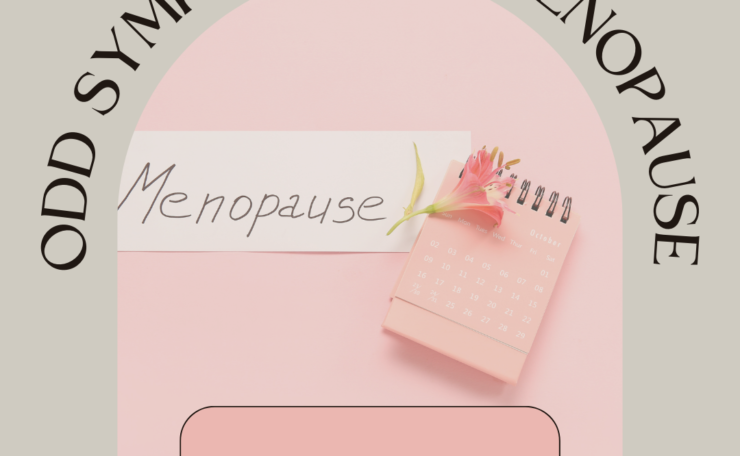
Week 1 – Odd Symptoms of Menopause and Solutions
Hot flashes and night sweats are what most people relate to as menopause symptoms. 80% of women going through menopause experience vasomotor symptoms (like hot flashes). There are some really strange and odd symptoms of menopause that are not often discussed. These hormonal shifts impact all systems of our body and are primarily driven by low estrogen levels and can result in itchy skin, burning tongue and other interesting symptoms.
Menopause is the natural biological change that marks the end of a woman’s reproductive years – when you have gone a full year without a period. Symptoms of menopause can start years before your period ends and the symptoms you experience can have you wondering if some of these crazy menopausal symptoms are normal.
We will, over the next 5 weeks, discuss some not so often discussed or uncommon symptoms of menopause and what you can do about them:
- Itchy ears
- Ringing in ears
- Burning tongue
- Electric shock sensation
- Tingling in the fingers or toes
- Cold flashes or chills
- Experiencing a metallic taste
- Thinning hair
- Loss of fullness in breasts
- Bloating and digestive changes
So, let’s get started with a few!
Menopause Itchy Ears
The feeling of itchy ears is a symptom of low estrogen that we rarely are told about. People with seasonal allergies may recognize this feeling of persistent itching deep in the ear canal. It’s easy to relate this symptom to allergies but it could also be a sign of menopause.
Why Does Menopause Cause Itchy Ears
Estrogen helps maintain hydration and plumpness in tissues by stimulating the production of natural oils and collagen. During menopause as estrogen levels decrease, the mucous membranes in the body can become dry, including those in the ears. This can lead to itching, burning and sometimes even wax build-up.
How Can You Stop Your Ears From Itching in Menopause
Avoid sticking Q-tips or other objects in your ears to scratch the itch because this can cause damage or further irritate your skin. Try gently rubbing a natural oil like olive oil into the ear or over-the-counter ear drops are also an option. Sleeping with a humidifier in your room can also help to keep the mucous membranes moist.
Tips for Itchy Ears in Menopause:
- Try olive oil, coconut oil or castor oil applied only to the outer ear canal
- Topical estriol on a Q-tip and applied to the outside of ear canal 2-3 times per week
- Sleep with a humidifier
- Stay hydrated
Menopause Ringing in Ears
Another symptom of menopause that is hormonally related is constant ringing in the ears – tinnitus. Tinnitus can be annoying for some and debilitating for others and can be challenging to treat in some cases. Because ringing in ears can be related to other causes, this is often one of the uncommon symptoms of menopause.
Why Does Menopause Cause Ringing in Ears?
This can start as one of the symptoms of perimenopause (the years leading up to menopause) as estrogen levels begin to drop. Although it’s not clear why this happens, it may be related to changes in circulation and estrogen’s influence on the auditory signals between the ears and your brain.
Estrogen plays a role in maintaining the health of the auditory pathways in the brain which is why this is another strange and weird symptom of low estrogen that most of us don’t know about.
How Do I Stop My Ringing Ears in Menopause?
Natural approaches to helping tinnitus can make a difference – exercise can reduce stress levels that could contribute to tinnitus. Diet can support the foundation for healthy hormone levels by ensuring your body gets all the necessary nutrients.
If tinnitus is impacting your sleep or causing anxiety, you may consider ways to support your nervous system and reduce stress. White noise machines may also help to drown out the ringing helping to promote better sleep. Some research is suggesting a higher intake of vitamin B12 can reduce the risk of tinnitus.
Tips for Ringing Ears in Menopause:
- Meditation and mindfulness.
- Yoga. A small study indicated participants practicing yoga along with deep breathing resulted in reduced ear ringing after 12 weeks.
- Magnesium – daily intake of 550 mg of magnesium is associated with a younger brain which may explain how magnesium might benefit the nervous system.
- Nutrient dense diet – in addition to eating foods rich in magnesium, vitamin B12 and other nutrients may also be helpful in supporting those with tinnitus.
Next week we will review Menopause and Burning Tongue and Menopause Tingling Extremities.
For guidance with menopausal symptoms, set up a complimentary chat here! Looking for support for perimenopause through post menopause? Sign up here.





